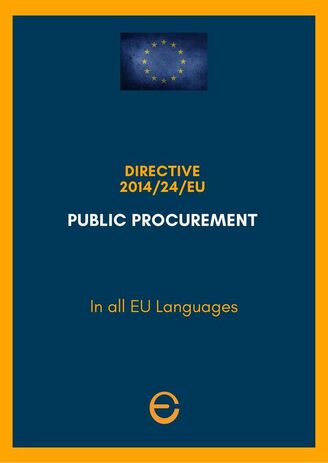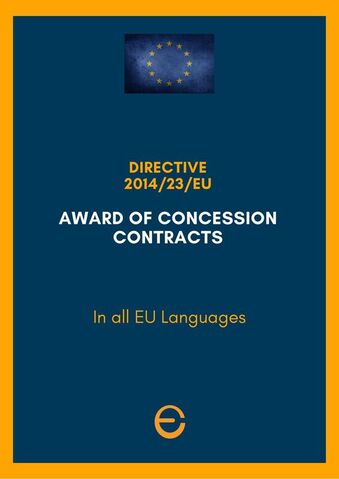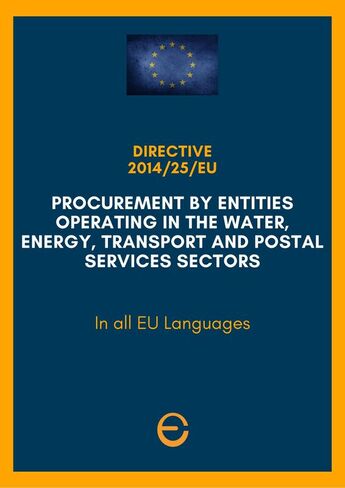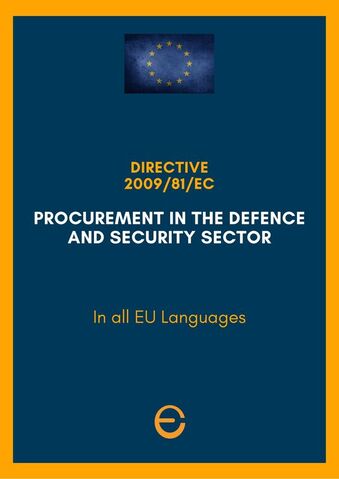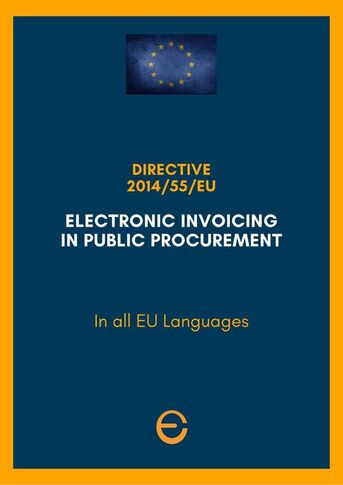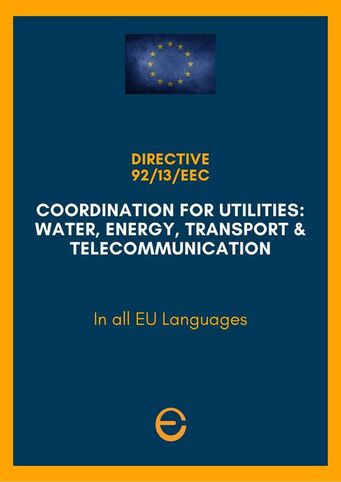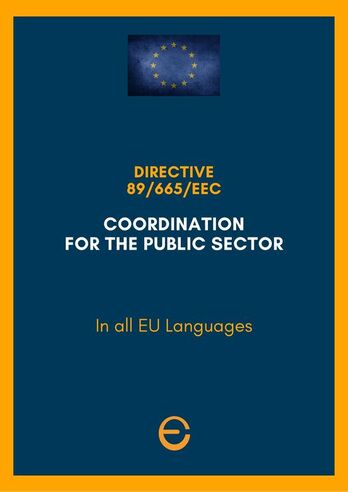To create a level playing field for all businesses across Europe, the EU law sets minimum harmonised rules for Public Contracts. These rules, transposed into national legislation, apply to the tenders whose monetary value exceeds a certain amount (see thresholds below). These ‘above threshold' tenders are, presumably, of cross-border interest; in other words - the tender value makes it worth-while for a business to submit a tender abroad.
General Rules
For tenders of lower value, national rules apply (which nevertheless have to respect general principles of EU law). The ‘below threshold' procedures may be simplified compared to the EU-wide tenders.
For all tenders, public authorities:
- may not discriminate against a business because it is registered in another EU country
- may not refer to specific brands, trademarks or patents when describing the characteristics of products & services they wish to purchase
- may not refuse to accept supporting documents (certificates, diplomas, etc.) issued by another EU country, as long as they provide the same level of guarantee
- must make all information regarding tenders available to all interested companies, regardless of what EU country they are registered in.
---> A public authority has the right to exclude your business from a call for tenders if it:
- is bankrupt or being wound up
- has suspended its activities or its activities are administered by a court
- has been found guilty of grave misconduct
- has not paid taxes or social security contributions
- has made false declarations to a public authority.
---> Only in specific cases public authorities may award contracts without publishing a call for tenders:
- emergencies due to unforeseeable events
- contracts that - for technical reasons or because of exclusive rights - can be carried out by one particular company only
- contracts that by law are excluded from public procurement (acquisition/rental of existing buildings, employment contracts, programme material for broadcasting, etc.).
Thresholds triggering EU‑wide rules (current values)
Amounts below do not include VAT and are valid from 1 January 2020.
Central Government Authorities |
|
≥ €139,000 |
Supplies contracts (for defence only those listed in Annex III of Directive 2014/24) |
≥ EUR 214 000 |
Supplies contracts for defence products not listed in Annex III of Directive 2014/24 |
≥ EUR 5 350 000 |
All works contracts |
Other Public Authorities |
|
≥ EUR 214 000 |
All supplies and services contracts |
≥ EUR 5 350 000 |
All works contracts |
Public tendering rules
1. Award criteria
Public authorities may use different criteria when evaluating tenders - for example they may select according to the lowest price offered or they may use other criteria. In the latter case, each applicant should be informed of the different weighting given to the different criteria (for example price, technical characteristics and environmental aspects).
2. Publication
Certain notices must be published for any public tender exceeding the thresholds and for which EU-wide rules exist:
- contract notice or notice of a design contest: the public authority may publish this notice nationally but should also send it to the EU Publications Office. The notice is published in full in one official language of the EU and a summary is translated into other languages
- notice of the contract award announcing the results of the public tender.
---> Public authorities may choose to publish other information notices, such as the prior information notice (announcing a possible upcoming tender). When a tender is eventually published following a prior information notice, the time limit to submit and receive tenders can be reduced. Another way of reducing the time limit is to publish the tender electronically.
A list of notices can be found in the buyers' corner on SIMAP, the European portal for public procurement.
3. Transparency
Public authorities may only begin evaluating tenders after the deadline for submission has expired. If you have submitted a tender, you have the right to be informed as soon as possible whether or not you have won the contract. If you have not been selected, you are entitled to a detailed explanation of why your tender was rejected. The public authority must observe strict confidentiality regarding the exchange and storage of your data.
4. Technical specifications
Technical specifications define the characteristics of the service, supply or works that the public authority intends to buy. They may include aspects of environmental performance, design, safety, quality assurance or conformity assessment. For public works contracts they may also include tests, inspection and construction techniques. Technical specifications should not require the use of a specific brand, trade mark or patent.
Types of public tendering procedure
1. Open procedure (Art. 27 of the Directive 2014/24)
In an open procedure any business may submit a tender. The minimum time limit for submission of tenders is 35 days from the publication date of the contract notice. If a prior information notice was published, this time limit can be reduced to 15 days.
2. Restricted procedure (Art. 28 of the Directive 2014/24)
In a restricted procedure any business may ask to participate but only those who are pre-selected will be invited to submit a tender. The time limit to request participation is 37 days from the publication of the contract notice. The public authority then selects at least 5 candidates possessing the capabilities required, who then have 40 days to submit a tender from the date when the invitation was sent. This time limit can be reduced to 36 days, if a prior information notice has been published.
---> In urgent cases the public authority may set a time limit of 15 days to receive participation requests (if the notice is sent electronically, this can be reduced to 10 days) and 10 days for the submission of the tenders.
3. Competitive procedure with negotiation (Art. 29 of the Directive 2014/24)
In competitive procedures with negotiation, any economic operator may submit a request to participate in response to a call for competition.
Unless otherwise provided for, contracting authorities shall negotiate with tenderers the initial and all subsequent tenders submitted by them, except for the final tenders to improve the content thereof.
The minimum time limit for receipt of requests to participate shall be 30 days from the date on which the contract notice or, where a prior information notice is used as a means of calling for competition, the invitation to confirm interest was sent. The minimum time limit for the receipt of initial tenders shall be 30 days from the date on which the invitation was sent.
4. Competitive dialogue (Art. 30 of the Directive 2014/24)
In competitive dialogues, any economic operator may submit a request to participate in response to a contract notice by providing the information for qualitative selection that is requested by the contracting authority.
After the publication of the contract notice, interested businesses have 30 days to request participation.
Only those economic operators invited by the contracting authority following the assessment of the information provided may participate in the dialogue. Contracting authorities may limit the number of suitable candidates to be invited to participate in the procedure in accordance with Article 65 of the Directive 2014/24. The contract shall be awarded on the sole basis of the award criterion of the best price-quality ratio in accordance with Article 67(2 of the Directive 2014/24).
5. Innovation partnership (Art. 31 of the Directive 2014/24)
In innovation partnerships, any economic operator may submit a request to participate in response to a contract notice by providing the information for qualitative selection that is requested by the contracting authority.
In the procurement documents, the contracting authority shall identify the need for an innovative product, service or works that cannot be met by purchasing products, services or works already available on the market. It shall indicate which elements of this description define the minimum requirements to be met by all tenders. The information provided shall be sufficiently precise to enable economic operators to identify the nature and scope of the required solution and decide whether to request to participate in the procedure.
The minimum time limit for receipt of requests to participate shall be 30 days from the date on which the contract notice is sent. Only those economic operators invited by the contracting authority following the assessment of the information provided may participate in the procedure.
6. Use of the negotiated procedure without prior publication (Art. 31 of the Directive 2014/24)
In the specific cases and circumstances laid down in paragraphs 2 to 5 of the Directive 2014/24, Member States may provide that contracting authorities may award public contracts by a negotiated procedure without prior publication.
7. Additional tendering techniques
Depending on the circumstances and needs a contracting authority may:
1. Open procedure (Art. 27 of the Directive 2014/24)
In an open procedure any business may submit a tender. The minimum time limit for submission of tenders is 35 days from the publication date of the contract notice. If a prior information notice was published, this time limit can be reduced to 15 days.
2. Restricted procedure (Art. 28 of the Directive 2014/24)
In a restricted procedure any business may ask to participate but only those who are pre-selected will be invited to submit a tender. The time limit to request participation is 37 days from the publication of the contract notice. The public authority then selects at least 5 candidates possessing the capabilities required, who then have 40 days to submit a tender from the date when the invitation was sent. This time limit can be reduced to 36 days, if a prior information notice has been published.
---> In urgent cases the public authority may set a time limit of 15 days to receive participation requests (if the notice is sent electronically, this can be reduced to 10 days) and 10 days for the submission of the tenders.
3. Competitive procedure with negotiation (Art. 29 of the Directive 2014/24)
In competitive procedures with negotiation, any economic operator may submit a request to participate in response to a call for competition.
Unless otherwise provided for, contracting authorities shall negotiate with tenderers the initial and all subsequent tenders submitted by them, except for the final tenders to improve the content thereof.
The minimum time limit for receipt of requests to participate shall be 30 days from the date on which the contract notice or, where a prior information notice is used as a means of calling for competition, the invitation to confirm interest was sent. The minimum time limit for the receipt of initial tenders shall be 30 days from the date on which the invitation was sent.
4. Competitive dialogue (Art. 30 of the Directive 2014/24)
In competitive dialogues, any economic operator may submit a request to participate in response to a contract notice by providing the information for qualitative selection that is requested by the contracting authority.
After the publication of the contract notice, interested businesses have 30 days to request participation.
Only those economic operators invited by the contracting authority following the assessment of the information provided may participate in the dialogue. Contracting authorities may limit the number of suitable candidates to be invited to participate in the procedure in accordance with Article 65 of the Directive 2014/24. The contract shall be awarded on the sole basis of the award criterion of the best price-quality ratio in accordance with Article 67(2 of the Directive 2014/24).
5. Innovation partnership (Art. 31 of the Directive 2014/24)
In innovation partnerships, any economic operator may submit a request to participate in response to a contract notice by providing the information for qualitative selection that is requested by the contracting authority.
In the procurement documents, the contracting authority shall identify the need for an innovative product, service or works that cannot be met by purchasing products, services or works already available on the market. It shall indicate which elements of this description define the minimum requirements to be met by all tenders. The information provided shall be sufficiently precise to enable economic operators to identify the nature and scope of the required solution and decide whether to request to participate in the procedure.
The minimum time limit for receipt of requests to participate shall be 30 days from the date on which the contract notice is sent. Only those economic operators invited by the contracting authority following the assessment of the information provided may participate in the procedure.
6. Use of the negotiated procedure without prior publication (Art. 31 of the Directive 2014/24)
In the specific cases and circumstances laid down in paragraphs 2 to 5 of the Directive 2014/24, Member States may provide that contracting authorities may award public contracts by a negotiated procedure without prior publication.
7. Additional tendering techniques
Depending on the circumstances and needs a contracting authority may:
- sign a framework agreement with one or a number of companies for tenders requiring recurring purchases
- when using the restricted procedure - authorise the use of the electronic dynamic purchasing system for making recurring purchases
- decide that to get the best offer, the final choice of the winner will be made through an electronic auction
Other important information
1. Your rights
Cross-border bids
If your company, organisation or institution is established in the EU(In this case, the 28 EU member states + Iceland, Norway and Liechtenstein.), you have the right to compete for a public tender in any EU country. You have the right to:
- compete for a public tender in another EU country without discrimination
- use supporting documents (certificates, diplomas, etc.) issued by your country
- have equal access to all information regarding tenders, regardless of the EU country in which you are established
- have access to the review procedures in the respective country
You may not be allowed to participate in a procedure if you or your company cannot be trusted, for example the tenderer:
- will be excluded if they do not pay their taxes or social security contributions, participate in corruption or a have links to a criminal organisation
- may be excluded if they are bankrupt, or guilty of grave professional misconduct
2. When a public tender should be published on TED
As a general rule, tenders for public contracts that fall under EU rules must be published in the online version of Supplement to the Official Journal of the European Union - the Tenders Electronic Daily (TED) portal. Public authorities may also choose to publish notices on the TED portal when a contract is of lower value. In TED the basic information for tenders is available in all official EU languages.
Prior information notice for upcoming tendersA procuring entity may also publish the prior information notice (PIN) on the Tenders Electronic Daily (TED) portal. The aim of the PIN is to provide you with information in advance about future procurement.
Normally the PIN is published between 35 days to 12 months prior to the publication of the contract notice.
When a tender is published following a prior information notice, the time limit to submit tenders can be reduced.
As a general rule, tenders for public contracts that fall under EU rules must be published in the online version of Supplement to the Official Journal of the European Union - the Tenders Electronic Daily (TED) portal. Public authorities may also choose to publish notices on the TED portal when a contract is of lower value. In TED the basic information for tenders is available in all official EU languages.
Prior information notice for upcoming tendersA procuring entity may also publish the prior information notice (PIN) on the Tenders Electronic Daily (TED) portal. The aim of the PIN is to provide you with information in advance about future procurement.
Normally the PIN is published between 35 days to 12 months prior to the publication of the contract notice.
When a tender is published following a prior information notice, the time limit to submit tenders can be reduced.
3. Evaluation
Tenders are evaluated by awarding points based on pre-published criteria, with each category worth a certain amount; for example the price offered may be worth 40%, technical characteristics 50% and environmental impact 10%.
The evaluation of tenders may only begin after the deadline for submission has expired.
Tenders are evaluated by awarding points based on pre-published criteria, with each category worth a certain amount; for example the price offered may be worth 40%, technical characteristics 50% and environmental impact 10%.
The evaluation of tenders may only begin after the deadline for submission has expired.
4. Awarding the contract
You should be informed as soon as possible as to whether you have won the contract or not. If you have not been selected, you are entitled to an explanation of why your tender was rejected.
If you feel that you have been discriminated against, or noticed irregularities in the procedure, you can request a review of the procedure or file a complaint.
You should be informed as soon as possible as to whether you have won the contract or not. If you have not been selected, you are entitled to an explanation of why your tender was rejected.
If you feel that you have been discriminated against, or noticed irregularities in the procedure, you can request a review of the procedure or file a complaint.
5. Electronic invoicing
If you have been awarded a public contract or concession contract, you have the right to send electronic invoices – that comply with the European Standard for eInvoicing – to the public authority that awarded the contract.
All centralised national administrations in the EU are obliged to accept your invoices. In certain countries, the public authorities at the sub-central level will also have accept electronic invoices by April 2020. Check the situation in your country.
If you have been awarded a public contract or concession contract, you have the right to send electronic invoices – that comply with the European Standard for eInvoicing – to the public authority that awarded the contract.
All centralised national administrations in the EU are obliged to accept your invoices. In certain countries, the public authorities at the sub-central level will also have accept electronic invoices by April 2020. Check the situation in your country.
EU Legislation
1. Public Procurement
This Directive establishes rules on the procedures for procurement by contracting authorities with respect to public contracts as well as design contests, whose value is estimated to be not less than the thresholds laid down by this Directive.
2. Award of Concession Contracts (motorway, bus route, etc.)
The aim of this Directive is to set out the EU rules for procurement by public sector contracting authorities and by contracting entities in the utilities sector by means of a concession (e.g. the right to operate infrastructure, such as a motorway, or a service (e.g. a bus route).
The aim of this Directive is to set out the EU rules for procurement by public sector contracting authorities and by contracting entities in the utilities sector by means of a concession (e.g. the right to operate infrastructure, such as a motorway, or a service (e.g. a bus route).
3. Procurement by entities operating in the water, energy, transport and postal services sectors
The aim of this Directive is to set out the EU rules for procurement by entities operating in the water, energy, transport and postal services sectors.
The aim of this Directive is to set out the EU rules for procurement by entities operating in the water, energy, transport and postal services sectors.
4. Procurement in the defence and security sector
This Directive sets out EU procurement rules, adapted to the specificities of the defence and security sectors.Specific procurement rules for the defence and security sectors are necessary in order to open up EU defence markets without putting at risk legitimate security interests of EU countries. This EU Directive increases competition and transparency in these sectors, thus enabling European companies to tender for more of defence and security contracts throughout the EU.
This Directive sets out EU procurement rules, adapted to the specificities of the defence and security sectors.Specific procurement rules for the defence and security sectors are necessary in order to open up EU defence markets without putting at risk legitimate security interests of EU countries. This EU Directive increases competition and transparency in these sectors, thus enabling European companies to tender for more of defence and security contracts throughout the EU.
5. Electronic invoicing in public procurement
As part of the process of modernising public administration in Europe, EU decided a Directive which aims to facilitate and encourage the use of e-invoices for public procurement contracts, particularly for companies working on contracts in another EU country.
As part of the process of modernising public administration in Europe, EU decided a Directive which aims to facilitate and encourage the use of e-invoices for public procurement contracts, particularly for companies working on contracts in another EU country.
6. Coordination for procurement procedures of entities operating in the water, energy, transport and telecommunications sectors
This Council Directive requires EU countries to ensure that decisions on the award of public contracts and concessions in the utilities sector, as well as preliminary procedural decisions in that context, can be reviewed quickly and effectively on the grounds that those decisions have infringed EU public procurement law.
This Council Directive requires EU countries to ensure that decisions on the award of public contracts and concessions in the utilities sector, as well as preliminary procedural decisions in that context, can be reviewed quickly and effectively on the grounds that those decisions have infringed EU public procurement law.
7. Awards of public contracts and concessions: review procedures
This Council Directive requires EU countries to ensure that decisions on the award of public contracts and concessions, as well as preliminary procedural decisions in that context, are reviewed quickly and effectively in the event they have infringed EU public procurement law.
This Council Directive requires EU countries to ensure that decisions on the award of public contracts and concessions, as well as preliminary procedural decisions in that context, are reviewed quickly and effectively in the event they have infringed EU public procurement law.
Source: European Union, http://www.europa.eu/, 1998-2024
|
Brussels - Milano - Nice - Tokyo
|
eEuropa Belgium
Avenue Louise, 367 1050 Brussels BELGIUM Bld. Franck Pilatte, 19 bis
06300 Nice FRANCE YONO HOUSE 9-1 KAMIOCHIAI, SAITAMA-SHI, SAITAMA-KEN 〒 338-0001 JAPAN Via S. Veniero 6 20148 Milano ITALY |
All rights reserved - © Copyright eEuropa Belgium 2020-2024

